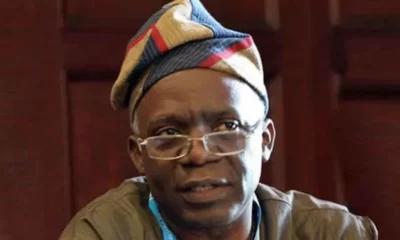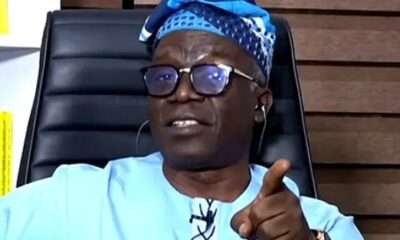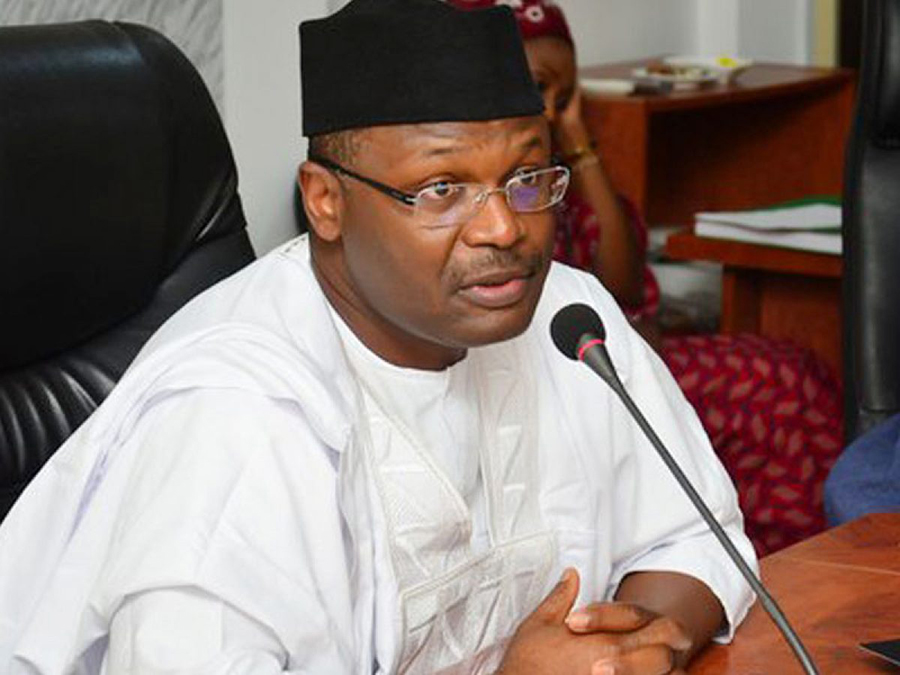Headline
Meet Couples Who Are Senior Advocates Of Nigeria
Published
7 months agoon
By
Editor
The legal profession in Nigeria is undoubtedly a vibrant one, having produced many brilliant minds who have achieved a lot in that space. FAITH AJAYI takes a look at couples where both the husbands and wives belong to the prestigious club of Senior Advocates of Nigeria
Adegboyega and Victoria Awomolo
Adegboyega
Adegboyega Awomolo was born on September 19, 1947, at Orile-Ilugun, Abeokuta, Ogun State. He attended St. James Primary School, Orile-Ilugun, for his elementary education and Anglican Secondary School (modern) Orile-Ilugun for his secondary education before proceeding to University of Ife, (now Obafemi Awolowo University) where he bagged his law degree in 1977 and was called to the Bar on July 7, 1978.
He went on to observe the mandatory one-year National Youth Service Corps scheme in Kwara State, and was posted to the Kwara State Ministry of Justice, where he was adjudged as the ‘Best Corper of the Year’, and decorated by the then military administrator of the state.
After his youth service in 1979, he joined the law office of Tunji Arosanyin & Co, in Ilorin.
Speaking in an interview some time ago, Adegboyega thanked some of the legal luminaries who helped his career. He said, “I was lucky to have the privilege of Afe Babalola (SAN) as my father in the legal profession. He was available to give me a shoulder to rest on. He gave me every chance and opportunity to grow in the knowledge of the law. He taught me to be charitable and kind to everyone around me, as a giver never lacks.
“Chief Tunji Arosanyin gave me the platform and opportunity, and I will forever remember because he gave me his office to practice, manage and cut my legal teeth from 1979 to 1983.”
In 1992, the Nigerian Bar Association, at its annual conference held in Port-Harcourt, Rivers State, was unable to conclude its election of officers. This was followed by various court orders and counter orders obtained by aggrieved members.
The military government at the time, under General Sani Abacha, then intervened at the instance of the Body of Benchers with a decree that dissolved the NBA, and gave the Body of Benchers powers to appoint administrators for the NBA.
Awomolo was then appointed as the Chairman of all the 44 branches Chairmen and Secretaries of the association. In that capacity, he travelled across the country and held meetings in almost all the branches between 1996 and 1998.
As a testament to his illustrious career, Awomolo became a SAN in July 1992. He has also handled several national and international cases, such as constitutional matters all the way to the Supreme Court, presidential and governorship election petitions, and civil and criminal cases, both as a Federal Government-appointed prosecutor and also as a defense lawyer.
The respected lawyer was also the first Attorney General and Commissioner for Justice in Osun State in 1991.
He is also a Fellow of the Nigeria Institute of Advance Legal Studies and Chartered Institute of Arbitration, as well as a member of the National Executive Council of the Nigerian Bar Association, and the Vice Chairman of the Body of Benchers.
Awomolo, who is the Asiwaju of Igbajo and Baamofin of Igbajo, is also the Chief Executive Officer of the law firm, Awomolo and Associates, where his wife, Olufunmilayo, who also became SAN in 2013, works as the managing counsel. His areas of practice include tribunal, criminal law, aviation, banking and insurance, among others.
READ ALSO: Kanu’s Release Tops Agenda As Obasanjo Meets Ohanaeze Leaders
Victoria Awomolo
Olufunmilayo Awomolo was the 18th female to become a Senior Advocate of Nigeria. She is also the Vice President of Africa North and West of the international region of the International Federation of Women Lawyers. She was elected in 2017 during a FIDA conference held in the Bahamas.
Born on December 18, 1957, she started her education at Salvation Army Primary School, Ilesa, Osun State, before proceeding to IIesha Grammar School for her secondary education. For her A levels, she attended the Kwara State College of Technology, Ilorin. She went on to study Chemistry at the University of Benin and graduated in 1981.
While undergoing her NYSC programme in 1981, she taught Chemistry at Army Day Secondary School Bida, Niger State, and later joined the Ministry of Education, Kwara State, in 1982 and was posted to Queen Elizabeth School, Ilorin, where she taught chemistry for 10 years.
She then returned to school for a second degree in Law at the University of Ibadan and emerged as the best graduating student in Labour Law in 1996. Olufunmilayo was called to the Nigerian Bar in 1998.
She has almost 20 years of experience in the field of commercial litigation and arbitration. She is a member of a number of professional organisations, such as the International Federation of Women Lawyers, and the International Bar Association. Through the FIDA platform, she showcases her passion for the protection of the rights of women and children.
She has also been involved in many constitutional and election cases and was also part of the team of lawyers that advised the Federal Government on matters relating to the oil and gas industry, and fuel subsidy.
Her love and passion for the legal profession have spurred her to attend many conferences, including the Nigerian Bar Association, International Bar Association, Commonwealth Lawyers Conference, and FIDA Convention and regional congresses.
She is a member of the Nigeria Bar Association, International Bar Association, Commonwealth Lawyers Association, International Federation of Women Lawyers Association, Chartered Institute of Arbitrators (United Kingdom), and Chartered Institute of Arbitrators of Nigeria.
She has also held several positions, which include Secretary, Organising Committee, NBA Conference Ilorin 2007; Secretary, International Federation of Women Lawyers, Kwara State Branch (2004-2006); Chairman, Organising Committee, Two decades of FIDA; and Vice Chairperson, FIDA, Abuja branch (2013-2016).
Possessing the potent combination of beauty and brain, she is the Yeyemofin of Igbajoland.
Speaking in an interview, Olufunmilayo noted that she was open to serving her people. She said, “Yes, if I have the opportunity and feel safe about it because the way politics is being played in Nigeria calls for caution. At my age, I must be careful. I won’t just jump into politics. I would rather wish to be approached to represent my people. That way, I would have their support. However, I don’t have the kind of money to put into politics, but God can provide.”
Blessed with wonderful children, she has been a pillar of support for her husband over the years.
READ ALSO: FG Begins Payment Of October 2023 Wage Award
Femi and Funmi Falana
Femi
The popular human rights activist, Femi Falana, was born on May 20, 1958, in Ilawe, Ekiti State.
He attended St. Michael’s School (1963 to 1968) after which, he went to Sacred Heart Catholic Seminary from 1971 to 1975.
He later studied English at the University of Ife (now Obafemi Awolowo University) from 1977 to 1981, but switched to Law after his first year.
He was called to the Bar in 1982 and became a SAN 30 years later in 2012.
Shortly after being called to the Bar, Femi joined the chambers of Alao Aka Bashorun, where his zeal for activism was nurtured.
In 1991, he started his chambers, which later metamorphosed into Falana and Falana Chambers, which he runs with his wife, Funmi.
In 2007, he contested and lost the governorship election of Ekiti State on the platform of the National Conscience Party, a party he served as National Chairman in 2011.
Femi was arrested on May 23, 1995, by the State Security Service and detained for 24 hours over his defence of the leader of the Movement for the Survival of Ogoni People, Ken Saro-Wiwa, who was later executed by General Sani Abacha regime.
He also was held for eight months at the Hadeja prison in Jigawa State, on the charge that he was a threat to national security.
He has held a number of positions, including being a legal adviser, Campaign for Democracy (1990-1995); Secretary-General, African Bar Association (2000 to 2004); and President, Committee for the Defence of Human Rights, (1997 to 2000).
He is also the Publisher and Editor-in-Chief, Weekly Report of Nigeria; and a member of the Council of Legal Education.
Falana belongs to many professional bodies, including the West African Bar Association; Nigerian Bar Association; Nigerian Institute of Chartered Arbitrators; Pan African Lawyers Union; International Bar Association; African Bar Association; and honourary member of the American Bar Association.
He is a recipient of several national and international awards, such as Defender of the Year Award from the International League for Human Rights in 2000; the Ogoni Merit Award in 2002; Dr Kwame Nkrumah Leadership Award in 2003; and the Bernard Simon Memorial Award for the Advancement of Human Rights in 2003.
He is the father of a popular rapper, singer, comedian and actor, Folarin (Falz).
Funmi Falana
Funmi Falana is a women’s rights activist, and she recently became a Senior Advocate of Nigeria on November 27, 2023.
For her secondary education, she attended St. Louis Girls’ Grammar School, Akure, Ondo State; before earning a Bachelor of Science degree in Physics from the University of Benin. She later went on to study Law at the University of Lagos. She also earned a Master’s degree from the same university.
She is currently the National Director of Women Empowerment and Legal Aid, a non-governmental organisation that advocates for women’s and children’s rights.
Through this organisation, she has led campaigns against rape, women’s marginalisation and participation in politics, gender-based, policy and decision-making.
She also challenged Regulation 124 of the Police Act, which prohibited female officers from getting married until after three years of service, and the provision was eventually declared unconstitutional and discriminatory against women.
On January 28, 2021, in a letter titled, ‘Request to Recall Dismissed Pregnant Police Officer’, Funmi asked the Inspector General of Police, Ibrahim Adamu, to reinstate Corporal Olajide Omotola of the Ekiti State Police Command, who was dismissed for getting pregnant out of wedlock. She said she would challenge Omotola’s dismissal at the National Industrial Court of Nigeria and pray for the annulment of Regulation 127 made pursuant to the Police Act, 2020 if the police authority failed to reinstate her within a reasonable time
The erudite lawyer is also a member of several professional and leadership organisations, both within and outside Nigeria.
She is a member of the Nigerian Bar Association, the West African Bar Association, the International Bar Association, and the Chartered Institute of Arbitrators.
READ ALSO: ‘No Gree For Anybody’, Other Slangs That Will Set Tone For 2024
Epiphany and Valerie Azinge
Epiphany
Epiphany Azinge, who was born in Aba, Abia State, on November 13, 1957, is a native of Oshi¬mili South Local Government Area, Delta State.
Between 1970 and 1975, he attended St. Patrick’s College, Asaba, before proceeding to the University of Lagos in 1976, where he obtained a degree in Law, finishing with a Second-Class Upper Division.
In 1980, he was called to Bar, after which he proceeded to the University of London for his second degree, specialising in Comparative Constitutional Law and Shipping Law in 1983.
An avid learner, he went on to bag a PhD in 1986.
His career began as a lecturer at the University of Benin in 1981, where he taught several courses, including the Nigerian Legal System, Legal Process, Juris¬prudence, Constitutional Law, Labour Law, Pub¬lic International Law and Administrative Law. He also taught Information Technology Law and Law of Taxation at the University of Abuja; as well as the Nigerian Legal System at the Nassarawa State University.
He was an external examiner of PhD dissertations at the Ahmadu Bello University, Zaria, Kaduna State; the University of Jos (2006); and the University of Kwazulu, Natal, South Africa (2008).
He was a member of the Nigerian Bar Association Section on Legal Practice (2004 -2008), Continuing Legal Education Committee (2003 -2006), the Chairman, NBA Section on Business Law, and its sub-committee on Sports and Entertainment.
He became a Senior Advocate of Nigeria in 2006.
Committed to contributing to the study of Law, Epiphany has published extensively on diverse areas in local and international journals. He has edited over 63 books.
Epiphany was appointed Special Assistant to the Attorney General of the Federation and Minister of Justice, Michael Agbamuche, from 1991 to 1997.
During that period, he contributed to many landmark legal developments that led to the promulgation of several enactments, including the Banks and Other Financial Institutions Act, Failed Banks Act, Advanced Fee Fraud Act, Money Laundering Act, and Nigerian Drug Law Enforcement Agency Act.
In May 2009, he was appointed the fifth Director General of the Nigerian Institute of Advanced Legal Studies.
Aside from his academic career, he is involved in community development through his foundation, the Sojourners Medicate Foundation, which he personally funds to help accident victims on the highways, as well as award scholarships to indigent Nigerians.
He is a member of the Nigerian Bar Association, International Bar Association, Chartered Institute of Arbitrators, Commonwealth Secretariat Arbitral Tribunal, London, United Kingdom (2015). He is also the President-General of the Asaba Development Union.
In recognition of his academic and administrative accomplishments, he was awarded a honourary LLD in 2013 by the Commonwealth University, Belize. He was also bestowed with the national honour– Officer of the Order of the Niger in 2014 by former President Goodluck Jonathan.
In recognition of his contributions to his community, he was given the chieftaincy title, ‘Okailolo of Asaba’, while his wife Dr (Mrs) Valerie Azinge, was given the title, ‘Odoziaku of Asaba’, in 2011.
Valerie Azinge
Valerie Azinge was born in Enugu North/Nsukka Senatorial Zone of Enugu State. In 1980, she graduated from the University of Jos and was called to the Nigerian Bar in 1981.
She bagged a second degree from the London School of Economics and Political Science in 1984, and obtained a PhD in Law from Ambrose Alli University, Ekpoma, Edo State, in 1990.
She is a former Commissioner and member of the Governing Council of the National Human Rights Commission, and was the first Special Rapporteur on Summary, Arbitrary and Extrajudicial Executions in Nigeria.
Valerie is a member of some professional bodies, including the Nigerian Bar Association. She is the Chairman of the association’s Committee on Family and Child’s Rights; Member, NBA Section on Legal Practice; as well as a member of the International Bar Association and World Jurists Association.
She is the author of the Jurisprudence of Failed Banks Tribunal and the Law of Broking in Nigeria.
She has held several political offices, including being a Commissioner, National Human Rights Commission (1996 -2000).
Valeria and her husband, Epiphany, founded the Azinge and Azinge Law firm, and she holds sway as the Managing Partner.
She was awarded the national honour of the Officer of the Federal Republic.
You may like


Hardship: Falana Seeks Protection For NLC Protesters, Writes AGF


Nigeria Should Join BRICS, Sell Crude Oil In Naira – Falana Tells FG


VIDEO: Reject IMF, World Bank Offers – Falana Cautions FG


Court Of Appeal Upheld Abba Yusuf’s Election – Femi Falana Reveals


Why ECOWAS Can’t Justify Intervention In Niger Without UN’s Approval – Falana [SEE LEGAL REQUIREMENTS]


Assault: Falana To Defend Seun-Kuti, Singer May turn Self In Monday
Headline
Barack Obama, Wife Endorse Kamala Harris For US President
Published
16 hours agoon
July 26, 2024By
Editor
Former US President Barack Obama and his wife Michelle have endorsed Kamala Harris’ bid for Presidency.
In a one-minute long video that captured a private phone call between the couple and the Vice President, Harris expressed gratitude for the endorsement and their long friendship.
“We called to say Michelle and I couldn’t be prouder to endorse you and to do everything we can to get you through this election and into the Oval Office,” Obama told Harris.
READ ALSO: [JUST IN] US Elections 2024: Biden Drops Out Of Presidential Race Amid Pressure
“I am proud of you. This is going to be historic,” the former first lady told Harris.
“Earlier this week, Michelle and I called our friend Kamala Harris. We told her we think she’ll make a fantastic President of the United States, and that she has our full support,” Obama said on social media platform X.
Responding, Harris said: “Thank you both. It means so much. And we’re gonna have some fun with this too”.
READ ALSO: Heated Rhetoric As Republicans Blame Biden For Trump Shooting
Obama, the first U.S Black president, remains one of the most popular figures in the Democratic party even after more than a decade has passed since he was last elected.
Harris is making plans to name a running mate by Aug. 7.
Advisers to former President Donald J. Trump said they would not commit to another debate, one they had already agreed to participate in, now that the Democrats have changed candidates from President Biden to Vice President Harris.
Headline
33 Nigerian Students Receive $2.92m Scholarships From American Universities, Colleges
Published
2 days agoon
July 25, 2024By
Editor
33 high achieving Nigerian students have received full scholarships totaling $2.92 million to attend American universities and colleges for the 2024/2025 academic session.
This feat was made possible through the Opportunity Funds Program of the United States Consulate General Lagos that is designed to increase access to U.S. higher education institutions for highly qualified international students who have limited resources to cover upfront costs of attending a university in the United States.
Delivering remarks at a reception in Lagos in honor of the U.S. bound students, Consul General Will Stevens congratulated the scholars on their admission to several outstanding U.S. universities to pursue studies in a diverse range of disciplines.
READ ALSO: Why I Don’t Have Houses In London, US – Dangote
He urged them to take advantage of the opportunities American universities have to offer and become actively involved in the many organizations and clubs that will enrich their experience as international students.
“This Fall, you will join the over 17,000 Nigerian students studying in the United States. You have successfully navigated the daunting U.S. college and university admissions process and we are so excited for your future. You have excelled in Nigeria, and I have no doubt that you will continue that path of academic excellence,” Consul General Stevens told the departing students.
One of the scholars, Chigozie Paul Odo, received full funding for a Ph.D. in Chemistry at the University of South Carolina. His doctoral research will focus on immuno-therapy with the goal of contributing to lasting solutions to the treatment of cancer.
Odo, who lost his father and sole breadwinner for his family during his second year at university, expressed appreciation to the U.S. government for covering the upfront costs of applying to U.S. universities through the Opportunity Funds Program.
“My dream of studying in the United States which seemed impossible is now a reality,” he added.
The 33 departing students — 10 undergraduate and 23 graduate students —will be studying a variety of subjects including biomedical engineering; computer science; mechanical engineering; earth and planetary sciences; organic and medicinal chemistry; civil, construction, & environmental engineering; among others.
Following a very rigorous selection process, the successful students received financial aid that covered expenses involved in the college application process such as standardized tests, application fees, U.S. visa and SEVIS fees as well as air travel to the United States. EducationUSA advisers worked closely with the students through regularly scheduled meetings, seminars and bootcamps, to support them throughout the application process.
Now in its 20th year, the Opportunity Funds Program underscores the importance of educational exchange and the positive impact it has on fostering mutual understanding and strengthening ties between the two nations.
Headline
Meta Deletes 63,000 Accounts In ‘Yahoo Boys’ Crackdown
Published
3 days agoon
July 24, 2024By
Editor
Meta Platforms Inc., the parent company of Facebook, Instagram, and WhatsApp, has removed 63,000 accounts associated with the notorious “Yahoo Boys” scam group, the company announced in its Q1 2024 Adversarial Threat Report on Wednesday.
The accounts, deleted over the past few weeks, were used for financial sextortion scams and distributing blackmail scripts. Meta reported that a smaller network of 2,500 accounts, linked to around 20 individuals, primarily targeted adult men in the United States using fake identities.
Meta said it identified and disabled these accounts through a combination of advanced technical signals and comprehensive investigations, enhancing its automated detection systems.
“Financial sextortion is a borderless crime, fueled in recent years by the increased activity of Yahoo Boys, loosely organised cybercriminals operating largely out of Nigeria that specialize in different types of scams,” the social media giant stated.
READ ALSO: Apple Challenges Meta In Virtual Reality, Unveils N1.6m Headset
It added, “We’ve removed around 63,000 accounts in Nigeria attempting to target people with financial sextortion scams, including a coordinated network of around 2,500 accounts.”
“We’ve also removed a set of Facebook accounts, Pages, and groups run by Yahoo Boys—banned under our Dangerous Organizations and Individuals policy—that were attempting to organize, recruit and train new scammers,” the company explained.
During the investigation, Meta said it found that most scammers’ attempts were unsuccessful, though some had targeted minors. These cases were reported to the National Center for Missing and Exploited Children.
Meta revealed that it also shared information with other tech companies via the Tech Coalition’s Lantern program to help curb these scams across platforms.
READ ALSO: FG Slashes Allowances Of Stranded Nigerians On Scholarship In Russia The Federal Gov
Further, the parent company of Facebook said it removed around 7,200 assets in Nigeria, including 1,300 Facebook accounts, 200 pages, and 5,700 groups that were providing scam-related resources.
These assets were found offering scripts and guides for scams and sharing links to collections of photos for creating fake accounts, it expounded.
Since this disruption, Meta’s systems have been actively blocking attempts from these groups to return, continually improving their detection capabilities.
The company noted that it has also been working closely with law enforcement, supporting investigations and prosecutions by responding to legal requests and alerting authorities to imminent threats.
READ ALSO: Top 10 Richest People In The World
The social media giant stated that its efforts extend beyond account removal.
“We also fund and support NCMEC and the International Justice Mission to run Project Boost, a program that trains law enforcement agencies around the world in processing and acting on NCMEC reports.
“We’ve conducted several training sessions so far, including in Nigeria and the Cote d’Ivoire, with our most recent session taking place just last month,” the firm revealed.
To protect users, especially teens, Meta disclosed that it has implemented stricter messaging settings for users under 16 (under 18 in certain countries) and displays safety notices to encourage cautious behaviour online.
READ ALSO: FG Slashes Allowances Of Stranded Nigerians On Scholarship In Russia The Federal Gov
Last week, Meta was fined $220m by Nigeria’s Federal Competition and Consumer Protection Commission for multiple violations of data protection laws linked to WhatsApp.
The investigation, initiated in May 2021, found that Meta’s privacy policies infringed on users’ rights, including unauthorized data sharing and discriminatory practices.
Meta plans to appeal the decision, arguing that it disagrees with the findings and the imposed penalty. The FCCPC aims to ensure fair treatment of Nigerian users and compliance with local regulations.

FULL LIST: Those Supporting, Against Aug 1 Nationwide Protest

Religious Leaders Harp On Tolerance At Grassroots Sensitisation Programme In Benin

Act Fast On Oil Spill Rocking Forcados Area, CSOs Task FG, Delta Govt
Trending

 News2 days ago
News2 days agoNationwide Protest: The Killer Is Afraid Of Death [OPINION]

 Metro5 days ago
Metro5 days agoConfusion As Female Passenger Dies In Lagos Keke Marwa

 News4 days ago
News4 days agoJUST IN: Tinubu Sends ₦70,000 Minimum Wage Bill To NASS

 Entertainment4 days ago
Entertainment4 days agoActress Denies Alleged Affair with Senate President Akpabio

 News2 days ago
News2 days agoBREAKING: INEC Can Handle Local Government Elections, Says Chairman Yakubu

 News3 days ago
News3 days agoPAP: Again, Otuaro Meets Stakeholders, Re-emphasises Importance Of Collaboration

 Headline3 days ago
Headline3 days agoBREAKING: SGF, NSA, Ministers In Emergency Meeting Over Planned Nationwide Protest

 Politics2 days ago
Politics2 days agoPlace Obaseki On Security Watch List, Edo APC Urges FG, As State Govt Kicks

 Headline4 days ago
Headline4 days agoElon Musk Opens Up About His Transgender Child

 News4 days ago
News4 days agoJUST IN: Senate Passes Minimum Wage Bill From N30,000 To N70,000



























